#also interview went well. ill be teaching some classes over the summer :3
Explore tagged Tumblr posts
Text
while i was In college i never had any luck with the free shelf (place where anyone can put/take things they don't want anymore) but i went in there today for a job interview and i got a brown genuine leather jacket thats my size? and almost perfect condition (has like. one or two tiny stains)
#personal#and im not like a Brand person but its ralph lauren too...#thank you stranger. but why did you put this on here#next to. idk. book no ones heard of + binder clip box + water bottle with water still in it#also interview went well. ill be teaching some classes over the summer :3#for highschoolers LOL
57 notes
·
View notes
Photo
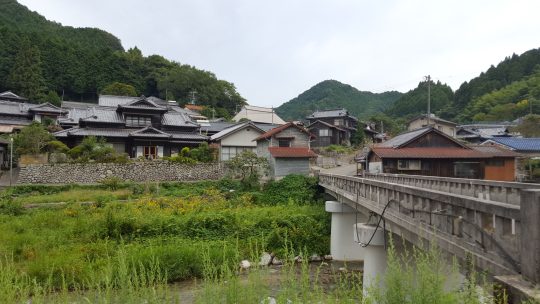
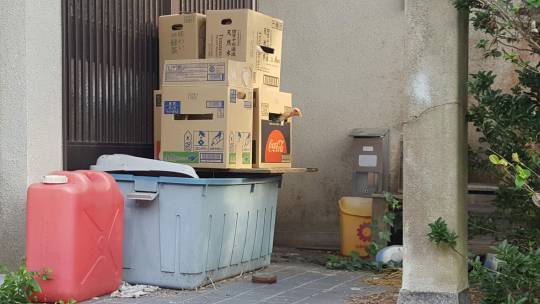

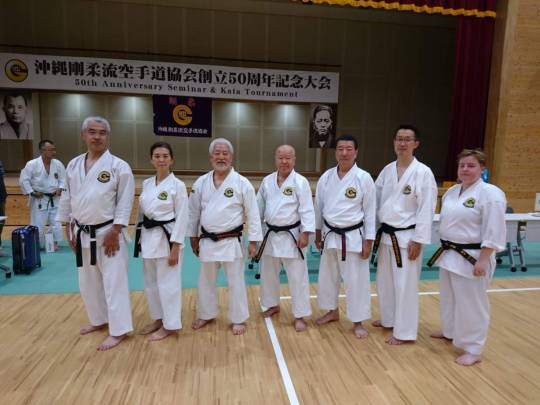
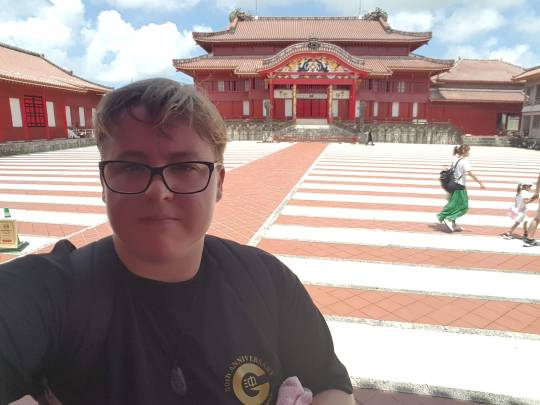
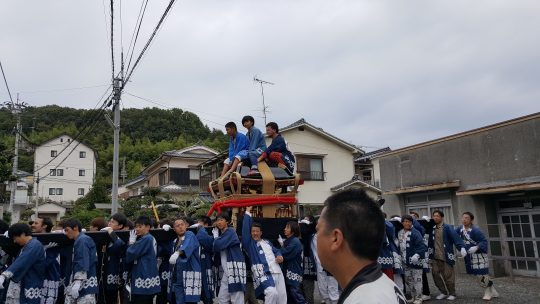

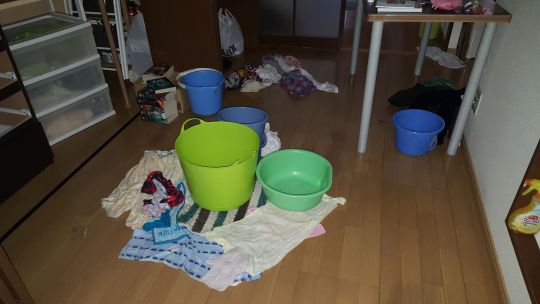
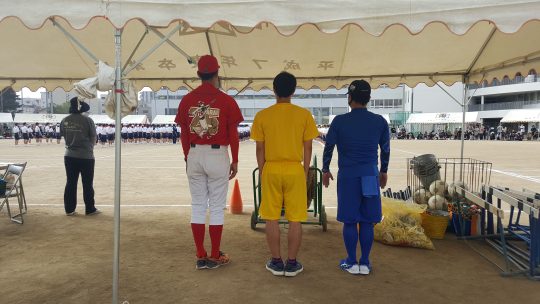
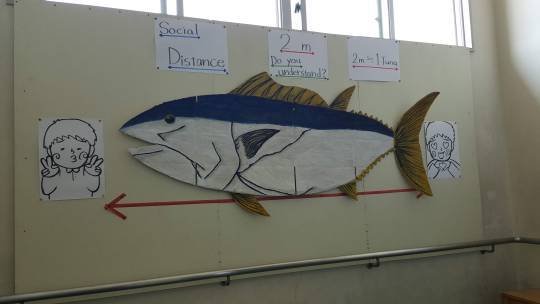
Winter of 2018 - Summer of 2021 TIME FILES WHEN YOU’RE IN YOUR 20s!!!!
OH BOY. It’s been three years (or more) since I updated this. “Time is a weird soup!” to quote a fave. I guess I quit tumblr around the time there was a purge of content and creators and a smack down on a lot of the fandom communities. Tumblr has always been something of a crapshow though so I’ve been more productive with my time than I was in some ways, but I’ve also found other ways to waste my time. *cough twitter/netflix/youtube/MTGArena cough*.
General Life Achievements since 2018 -JLPT N3 GET in 2019! -Blackbelt GET in 2018! -TESOL 120 Hour and BE 50 Hour Cert from online provider GET in 2021 -STUDENT LOAN BANISHED (Thank you grandparents) -Survived Apartment flooding in early 2020. -Mystery anxiety related illness and chronic pain in my left leg from early 2020 - Present. -A mythical 6th and 7th year on the JET Programme. -Started posting on Instagram a lot more about my wanderings around Matsuyama/Uwajima. Mainly old buildings and stray cats. @astormyknight -Surviving so far in Japan with old rona-chan.
2018 was rough. I was given an additional school in the first semester (March to July) as we had someone find a better job. I enjoyed it, but it was a bit of a rough go especially when I was transferred that August after three fantastic years at Tsubaki JHS and ES and only a semester there. I legit went through the five stages of grief - which I think is another reason I stopped blogging. I was given my current base school along with four other schools. Going from 2(3) to 5 schools was a bit of an adjustment. I still feel a bit spread out.
That said, I keep running into teachers and students who were at the Tsubaki’s. The teachers shuffle around every April, so it's always a lottery with which new faces are going to be old friends (or enemies…). A couple of kids moved and transferred into my current schools from Tsubaki too. So I have one kid I can say I've been teaching for 6 out of the 7 years I've been here!
One of the kids who was in JHS 3rd grade when I first got here (in 2015!) hangs out around one of my favorite cafes, so I got chatting with him recently. He's in his second year of nursing school - his class nearly broke me in the first year, it was really a trial by fire with those kids. I was 22 then, and he’s 20 now, so it was interesting chatting to him about that first year of teaching. His younger sister was one of my favorite students too, she was in the group of kids that graduated in the March of 2018, the year group that went through Tsubaki JHS with me - they’re newly minted University students now!
This Thursday morning when I was cycling in to work, a kid who was 2nd year JHS when I left (so 2nd or 3rd year JHS now) pulled up with their Mum in a van and got their mamachari out of the back to bike to school. The franticness of it all was hilarious. Their Mum legit sat on the horn until I pulled over. I was so happy to run into this kid, even at social distance and both of us late to work/school - because we both remembered each other and as they were going around the corners they were yelling each time they turned and humming the old elementary school directions chant and pelting me with questions about what I’ve been up to.
I've had so many students and schools now, that everything is kind of running into a blur. I remember flashes of kids faces and voices, random memories of in class or out of class shenanigans out of the blue. Also, I now, more than ever, have issues remembering kids' names, but I still know their faces (even with their masks), whose homeroom class they were in, who their friends were and which club they were in. I get random flashbacks to past conversations with them when I see them on the street or we run into each other. I feel bad because the first thing former students ask is ‘Do you remember my name?’ and I always have to be like, ‘Honestly, no, but I remember you did this on x day, x month in x classroom’.
Socially in 2018 -2019 - a few of our friends went home and things shook up a little. Our DnD group changed a bit - one of our players stepped into the role forever DM (THANK YOU RALPH). From memory the newbies were great - some of them just went home at the start of last month and it’s weird not seeing them around (JESS DO YOUR BEST!). I think we only have one or two people left from that rotation. There’s no 6th year ALTs, and only two 5th years.
Aug 2018 - Aug 2019 was the year of Hiura - my mountain school. Dang man, they were so cool. The students of the JHS and the ES combined barely hit 30, so each class was between 3-10 students depending on the grade. It was easier to get to know the kids, their abilities and their goals than it has been for me at other schools. I miss it so bad, being in nature once a week did my country-kid heart so good! The bugs! The frogs! The river! The mountain! The monkeys! The lizards! The dilapidated houses and hidden shrines!!!! The random crabs in the English room...I forgot that there was such a thing as freshwater crabs, and being right next to a river, the invasion wasn’t as out of place as I first thought...
The area is so picturesque and calming. Every week up there was a small adventure (after getting over my motion sickness from the bus ride up). The kids were constantly pranking either myself or the main English teacher. There was always some new weird bug or lizard in a tank to be educated about. There were chickens on the way to the JHS that used to escape from their cardboard box prisons to run riot on the gardens. There were old people to freak out with my youth and foreignness! The kids also got to do a lot of extra classes, sumiyakai (making charcoal the traditional way), planting and maintaining rice paddies, setting up vegetable gardens, raising fireflies, conserving a special breed of fire lily (only found in this particular mountain valley) and another rare flower, wilderness training ect.
I wish I could have stayed there a lot longer but SOMEONE (read...the BoE) decided that schools had to be shuffled again(thank goodness the dude who has it now was able to keep it from the 2021 shuffle, he's the best fit for the school). I had so many good memories from there, I wish I had been more consistent in writing it down. I do have a bunch of photos and videos from there though, so that's nice. The only thing I don’t miss is the bus trip up and down - not only was it motion sickness, there was a healthy dose of fear each ride as the driver brought us perilously close to the edge of the mountain drop…
2019 - 2020 was interesting. With the school I got given instead of the Hirua’s I was roped into more demonstration lessons which was a lot of pressure because I was also involved quite heavily with the JHS observation and training lessons too. They were somewhat rewarding, the third graders are now super smart 5th graders, but the teachers who need to embrace the new curriculum and ways of teaching really haven’t taken on anything from the lessons....
Outside of work as well, I was given the chance, thanks to an ALT buddy of mine, to join in with the local festival. It's been one of the biggest highlights of my time here, and I am gutted it’s been cancelled for the last two years, but I understand the reason…. I was able to travel to Okinawa too during that summer for an international Karate seminar with the Dojo I train with. I met the head of the style I currently practice and a bunch of people from around the world. I also got to see Shuri castle before it burned down. So that was a stroke of luck. One of the places I want to go when/if we get out of this pandemic is Okinawa. I want to see more of those Islands so bad. Just before the whole pandemic thing too - I managed to see the Rugby World Cup, a Canada vs NZ match, I even ran into Tana Umanga in Oita city!!!
2019 - 2020 was supposed to be my last year on JET, so I was frantically Job hunting. I went to the Career Fair in Osaka in early Feb/Late January 2020. I applied and got interviewed for a position in Sendai in early Jan 2020. In the end though - the Rona hit. We started hearing whispers of it around the end of 2019, then the cruise boats happened, and then Japan refused to cancel the Olympics...every holiday season there is a new wave of infections, my nurse friends in Tokyo are struggling....my teacher friends in more populous areas of Japan are struggling…
JET couldn't get new ALTs for 2020-2021, I took the extra year when it was eventually offered, as the one job I had managed to get a serious offer for was hesitating because with the rona setting in, things were uncertain. There was a lot of time spent adjusting to the new rules surrounding what we could do in class with the kids as well as textbook change. Schools shut on and off during the spring months.
I also got a reminder of my mortality mid May with an unrelated illness which is still smacking me around a bit - stress/age, it does things to the human body it has no right to. It's only been in the last three months I’ve been able to exercise like I used to, I’ve put on a bunch of weight I can't shrug off (one part medication, another part diet) My relationship with food needs to change, and I really need a kitchen that allows me for more than one pan meals. I also need to figure out what to do with a left leg that is in constant pain from the knee down and a heart that misses beats when stressed out (mentally and physically…).
My apartment also got flooded by the guy upstairs at one point, I spent most of late February/early March living in a hotel while my walls and floor got redone - I think this was one of the things that really stressed me out and kicked my anxiety right up a notch, it was right when things were getting REALLY bad with rona-chan in Hokkaido and schools were shutting down here as it was filtering into the prefecture and so Japan closed schools for the first time…
Classes in covid times have been weird. We’ve been wearing facemasks full time since the early stages of the pandemic (March 2020) - so I admit that I get a bit pissed off seeing both Americans and New Zealanders back home bitching about just having to start wearing them full time in public. I have asthma and have been suffering with the things on during the 30*C plus with high 90s humidity summers. Teachers were offered vaccines late July 2021, just days before the Olympics were open - and I finished my two shots in the middle of August. But the overall distribution and take up of the jab has been slow. As mentioned above, we can't play a lot of the games we used to play with kids in classes anymore, and a lot of the activities outlined in the textbook curriculum need to be adjusted too, so we’ve had to be creative. We use hand sanitizer a lot more too. One of the things I miss the most though, is eating lunch with the kids.
Socially from summer 2020 - now 2021 we played a lot of DnD and board games, both online and in person when we could. There were no new ALTs again for the 2021-2022 JET year, and those of us who were in 6th year were offered a 7th. Four out of six of us took it. As a whole we’re down from a peak of 38 ALTs for Junior High and Elementary school to 22 for now. We hopefully will get a new person at the end of September, and 4 more in November. Which will bring us to 27. This has led to ANOTHER round of school shuffles.
Summer vacation has been weird the last two years. With rona-chan, we haven’t really been able to travel. All the summer festivals (all the Autumn and Winter ones too!) have been cancelled, so the changing of seasons just feels, wrong. I dunno. There is so much we all miss from pre-rona-chan, and so much that doesn’t happen that makes this just feel like one long long unending year of sadness, coldness, raininess, unbearable heat and repeat. I’m tired. Time is going so fast, but so.dang.slow.
I lost my favorite school (AGAIN GDI!!!) and gained the school I taught a semester at in 2019....I had my first day there on Wednesday. Schools actually started back on September 1st so there was some drama as the BoE didn’t communicate fast enough about our school changes. We legit got told on the 27th of August (on a Friday) our schools were changing effective September 1st, but somehow some of our schools found out on the Monday 30th August. In July we were told we would be changing schools at the end of September, so.a lot of ALTs and schools were left short changed, not having opportunities to say goodbye to co-workers or students/having their planning for the semester more or less thrown out the window too. I love my job. I really dislike the way the BoE treats us, the Japanese assistant language teachers and our schools.
The new school I have is used to having an ALT there twice a week, who plans all the lessons and executes them. I’m at three elementary schools. I'm only at each once a week, I want to plan, but being that I miss an entire lesson in between visits, it's going to be difficult to do so. Not impossible, but being that I'm already doing it for two other schools, who are at two different places in the textbook ah…….. From what I have talked to my new supervisor about though, it sounds like the teachers have taken on more of the lesson planning and I'll be able to contribute ideas when I'm there. I just want to and wish I could do more without being confused all the time. (This is all usually done in my second language too, not in English so extra levels of confusion and miscommunication abound).
I feel like this at my JHS too a lot of the time. I want to contribute more, but even with constant communication with my main in school supervisor (who is a badass and pretty much on the same page about everything with me) I still feel about as useful as tits on a bull. Especially now that classes have been cancelled and or shortened, there's less time to do stuff. Any game or activity I plan is usually cut in favor of making up time in the textbook. When I'm in class, I'm back to being a tape recorder, the fun police and general nuisance.
Also in the last week...my two of my schools were shut due to students testing positive for the rona. This is the second time my schools have had a scare in the last 8 months. And by shut, I mean the students were all at home, but the teachers all had to come into the office. Because why not I guess….. I mean, the cases increasing is really not unexpected with the amount of people who were travelling over obon and the increase of cases due to the Olympics/Japan being slow on vaccinating/delta being the dominant strain/Japan's leaders doing relatively little except asking shops and restaurants to limit people coming in at one time and closing before 8pm. I know my schools weren't the only one shut either - but still High Schools were having their sports days this week. I kept on seeing groups of kids hanging in the park after, so that was a little bit nerve wracking.
It's just frustrating - we’ve been on half days to “minimize the risk of infection” for kids and teachers, as if only being at school from 8am through to 1pm is going to reduce the risk. My schools have only just started testing out Microsoft teams and Zoom lesson equipment. Thankfully our school’s run in this time was contained real quick, the family was super good about informing us when they got their results back, and the fact they needed to be tested. The homeroom teacher and the students from the same class were the only ones tested, and they all came back clear, which was nice. But the information came back so SLOW.
I’m a little irritated because I found out on Wednesday night what was going on, and even if I am vaccinated, I am super worried that I will end up being the covid monkey due to being at different schools three days out of five. I think other than being worried that I will catch it myself and get real sick, my biggest fear is that I will be protected from bad symptoms from the vaccine, but still be able to pass it onto some of my more vulnerable friends and students. The whole thing is a mess.
Other than Covid and BoE drama, life is good. I’ve had a couple of other big changes - both fantastic and not so great, but yeah. I have my health (and health insurance!) for now. I have a job, for now. I have a sense of existential dread for the next 12 months, but we’ll see where we end up. Life post JET is going to be way less cushy and I am TERRIFIED. I mean, I have a BA in Eng/Ling and no idea what to do with it…..because I am NOT suited for academia.
TLDR: Love my job. Don’t like the system. What is life? Future scary.
15 notes
·
View notes
Text
Education?
As a child life is good. No stressed, problems or life changing choices to be made. You go to school, study English, Maths, Topic and Music and once you have finished your day you go home to either play outside or stay inside. Same old every day. No bills, exams or jobs.
The moment you move in to year 9 it all changes, school enters a stressful time to prepare for your exams which do not start for 3 years, if you don’t have high target grades you are moved to the bottom of the pile and only “smart” students are given the full 100% package deal. I have never personally been a particularly academic subject; I excel in subjects like catering or design tech and this really did show on my Grade sheet. I came out with a 5 in maths, 5:5 in science and a 6 in catering. I straight away felt so down or even depressed as I thought I did well in my exams but now I must live the rest of my life with these failed subjects.
I did study and work hard during my exams but me and many other students let ourselves down at exams and do not have the confidence to show our full potential in exams. I personally struggle with exam stress. I know the answers and I know I do, but the moment I get into my exam my brain turns off. I am by no means stupid but because the numbers on the sheet don’t show it, I must struggle my way to do what I would like to do.
September came and I started in my local sixth form college, I already got denied entry into my preferred subjects so had to settle with Health and Social, Food, Science and nutrition and Geography which all were Btec subjects. I did what I had to do to get through the school day, I turned up to my lessons, volunteered my answers and remembered the information I was expected to regurgitate into my exams. I would then go home, do my homework and work on my coursework which involved a lot of reading studies and reports to complete.
By November I was in a terrible place with my mental health, I was doing well in my subjects, but it was not what I wanted to do, and I really hated going in to sixth form every day. I decided to drop out of sixth form and got a job in a local pub as a pot wash working at a rate of £4.20 an hour. I managed to get myself a place on an apprenticeship in mechanical engineering. I was really enjoying the studying and I was very happy to go home and research about what I had learned in my class. The tutors were great, the learning style worked with me and I looked forward to starting work after completing my level 1 NVQ. I was the first student in my intake to secure myself a job, it was in a small local press shop where the boss was willing to teach me how to use a new machine in the workshop that nobody else had been educated on. I was so excited to start until it came to my start date. I rolled out of bed an hour before I had to leave, showered ate some food and changed into my uniform. The day was great so far and I was looking forward to starting my lifetime profession. After I travelled for 45 minutes to get to work for my first day, I was greeted at the door with a surprised look, I gave one back and at this point I was utterly confused. After talking with my boss, he was waiting for my college to sort out some paperwork so I could not start yet. I went home confused and upset about how this had happened, especially considering I was the first to secure myself a place.
College did not contact me so I phoned up my tutor asking what was happening and she said that the paperwork had not been signed and I would have to start elsewhere. This was the first time in my apprenticeship I had felt down. Luckily college managed to secure me a place after a month of being behind my class in a different firm, which for the first month went well. During the month I was traveling around the UK installing air handling units. On the 24th of April while working locally I became ill and struggled to do the work as I got an infection but left it thinking it would sort itself out. I had to go to the doctors and when I went there, I got the appropriate antibiotics and was given a 10-day sick note. I was upset about not being able to get into work, but I phoned my boss and told him I was sick, had an infection and have been given a sick note. At this time college changed my day release from a Friday to a Tuesday so I was already employed the skin of my teeth as it was no longer effective or helpful having me leaving a job mid-week to go to college and I later got fired. Both the college and my mum were going on at me about tying to find other engineering employment but at this point I decided to focus on my own mental health and had to leave the college after 4 full months.
This is when the real stress started. Straight away I started seeking employment but everywhere was turning me down. I had to start paying rent at hone as my single mother was no longer getting benefits for me and the amount that was being asked, I would have to work stupid hours to cover on a wage of £4.20. I really started to struggle to do anything as I had so much money that was owed to everything, but I did not have a job. I also wanted to drive now and was also looking at going out during the summer. Currently I am starting plumbing in college in September. I know I will succeed and enjoy it as I have fixed bits around my mother’s house and enjoyed doing it. Still looking for a job and looking to work 2 jobs until September to keep on top of money.
I did not write this for empathy or your condolence, I wrote this to get my thoughts and feelings off my chest. I personally do not believe a student should be judged or compared to other students based on their GCSE grades, but should actually be judged based on their skills with people, or their ability to grasp new concepts or even someone’s eagerness to learn and excel in what they choose to do. When I do manage to work myself into the position of becoming an employer I will make sure that all of my staff are not judged by their grades at GCSE when they were 16 years old, but instead by their ability in the field of work they want to do. I would never turn down a job interview because someone hasn’t got 5 GCSE as I would always think about maybe they come from a disadvantaged family or area, poverty levels in the UK are higher than ever.
I also believe that even if a student does decide to leave their current education to put their own mental health first the person should be supported in this and offered support to find a new educational institute. No student should be willing to put themselves in a bad way to succeed in life. I personally am skilled in handyman jobs and have not struggled to do one yet. With 0 experience I have managed to build and design a decked area in my mother’s garden, change the whole water toilet water system to copper pipes and changed a shower to copper pipe with 0 experience. Grades are not the thing of the future but just a mark of the past. In the future students will be employed on their skills, creativity and ethics. I by far would rather employ someone who can complete a task over someone who has been taught to regurgitate information into an exam.
If anybody does take the time out of their day to ready this,
Thank you and I hope you succeed and become whatever you would like to in life. Always put your own mental health before anything and make sure you never let your grades get to you.
1 note
·
View note
Link
On March 15, 2019, legions of Ruth Bader Ginsburg’s admirers celebrated her 86th birthday by dropping to the ground and grinding out the Super Diva’s signature push-ups on the steps of courthouses around the country.
This unusual tribute to a Supreme Court justice was one of the many ways a new generation has shown the love to the five-foot tall legal giant who made the lives they live possible. But by Sept. 18, her iron will and gritty determination was no longer enough to propel her to court. Ginsburg died on Friday at the age of 87 of complications from metastatic pancreatic cancer, according to a statement released by the Supreme Court, per the Associated Press.
In the early ’70s—when Gloria Steinem was working underground as a Playboy Bunny to expose sexism, and Betty Friedan was writing a feminist manifesto about “the problem with no name”—Ginsburg named the problem, briefed it, and argued it before the Supreme Court of the United States.
She was 37 then, on the receiving end of so much of the discrimination she would work to end, and she was just undertaking her first job as a litigator—as co-director of the Women’s Rights Project of the American Civil Liberties Union. In her “very precise” way, as Justice Harry Blackmun put it, she studied title, chapter, clause, and footnote of the legal canon that kept women down and overturned those that discriminated on the basis of sex in five landmark cases that extended the 14th Amendment’s equal rights clause to women. In that long, hard slog, she employed some novel devices, using “gender” (so as not to distract male jurists with the word “sex”) and representing harmed male plaintiffs when she could find one (to show that discrimination hurts everyone). And she never raised her voice.
When she was done, a widower could get the same Social Security benefits as a woman and a woman could claim the same military housing allowance as a man. A woman could cut a man’s hair, buy a drink at the same age, administer an estate, and serve on a jury.
By the time she left the ACLU, and before she donned her first black robe, Ginsburg had brought about a small revolution in how women were treated, wiping close to 200 laws that discriminated off the books. Over the next decades, first as a judge on the U.S. Court of Appeals for the District of Columbia, appointed by President Jimmy Carter in 1980, and then as the second woman on the Supreme Court, appointed by President Bill Clinton in 1993, she would become to women what Thurgood Marshall was to African Americans. She employed the same clause in the 14th Amendment he used to free former slaves to extend protection to the mentally ill who wanted to live outside institutions, gays who wanted to marry, immigrants who lived in fear, and, of course, females: those who wanted to be cadets at the Virginia Military Institute, have access to abortion, and, when pregnant, not be fired if they couldn’t perform duties their condition made, temporarily, impossible.
Her fans’ courthouse celebration was also a plea for the bionic Ginsburg to carry on, at least until the 2020 election. There was high anxiety when she fell asleep at the State of the Union in 2015 (a case of enjoying a fine California wine brought by Justice Anthony Kennedy to the justices pre-speech dinner) and even more when she missed the court’s 2019 opening session in January, her first such absence in 26 years. She hadn’t fully recovered from surgery to remove three cancerous nodules from her lungs. But she took her seat as the senior justice next to Chief Justice John Roberts in mid-February, picking up her full caseload. That following summer, she went through radiation to treat a cancerous tumor on her pancreas, her fourth brush with cancer. In July 2020, she announced that cancer had returned yet again. Despite receiving chemotherapy for lesions on her liver, the 87-year-old reasserted that she was still “fully able” to continue serving on the Supreme Court.

Collection of the Supreme Court of the United StatesAugust 2, 1935 Childhood photograph of Ruth Bader taken when she was two years old.
Baton-twirling bookworm
Joan Ruth Bader was born in 1933 in Brooklyn and came of age during the Holocaust, “a first-generation American on my father’s side, barely second-generation on my mother’s … What has become of me could happen only in America,” she said at her confirmation hearing.
True enough, but what would become of her was a long time coming. In an enthralling biography, Jane Sherron De Hart describes schoolgirl Ruth, who twirled a baton but was such a bookworm she tripped and broke her nose reading while walking. Her mother, who convinced her she could do anything, died just before Ruth, the class valedictorian, graduated and headed off to Cornell. There she met the tall, handsome Martin Ginsburg, and married him the minute she graduated Phi Beta Kappa—the first person, she said, who “loved me for my brain.” She’d been accepted to Harvard Law, where Marty was already enrolled. She calls “meeting Marty by far the most fortunate thing that ever happened to me.”
What happened next is proof of her maxim that “a woman can have it all, just not all at once.” Marty was called up to active duty, so instead of studying torts in Cambridge, Ginsburg found herself working as a claims examiner at the Social Security Administration in Fort Sill, Oklahoma—that is, until she was demoted with a pay cut for working while pregnant.
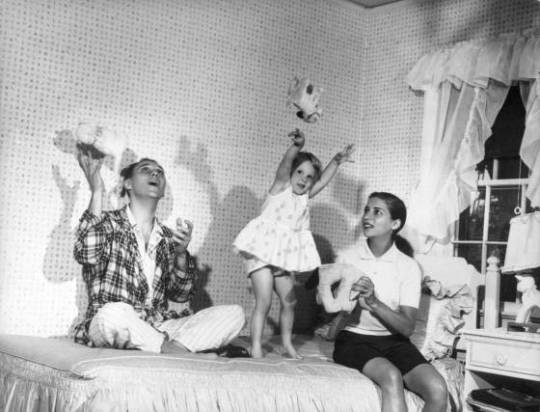
Collection of the Supreme Court of the United StatesSummer 1958 Ruth Bader Ginsburg and Martin Ginsburg play with their three-year old daughter, Jane, in her bedroom at Martin’s parents’ home in Rockville Centre, N.Y
Life threw another wrench into the works when both were back at Harvard with a baby girl, and Marty was stricken with a rare testicular cancer. Ruth went to class for both of them, typing up his notes and papers as well as her own, getting along on even less sleep than your usual new mother, all while being scolded for taking up a man’s seat by Dean Erwin Grisold. When her husband graduated and was offered a prestigious job at a white shoe law firm in New York, she gave up her last year at Harvard to finish at Columbia.
Once again, she felt the sting of the discrimination. Despite being the first student ever to serve on both the Harvard and Columbia Law Reviews and graduating at the top of her class, she couldn’t get a job at a premier law firm or one of the Supreme Court clerkships that went so easily to male classmates who ranked below her. According to DeHart, Judge Felix Frankfurter fretted a woman clerk might wear pants to chambers. Without bitterness, she calls anger a useless emotion; she noted that in the ’50s, “to be a woman, a Jew and a mother to boot—that combination was a bit too much.”

Librado Romero—The New York Times/Redux 1972 Ruth Bader Ginsburg in New York, when she was named a professor at Columbia Law School.
Battling discrimination
She didn’t get outwardly angry and only, after many years, got even. She took a lower court clerkship, researched civil procedure (and equality of the sexes in practice) in Sweden and wrote a book on the subject—in Swedish! She returned home to teach at the Newark campus of Rutgers Law, where she co-founded the Women’s Rights Law Reporter. Despite being a progressive school, discrimination struck again. She learned she didn’t earn the same as a male colleague because, the dean explained, “he has a wife and two children to support. You have a husband with a good paying job in New York.” No wonder then, when she found herself surprisingly (given her husband’s medical history) but happily pregnant again, she took no chances and hid it.
After the birth of her son, James, she became a tenured professor at Columbia, co-authored the first case book on discrimination law, a work in progress as she changed much of it while litigating for the ACLU, until in 1980 she joined the Court of Appeals.
Then, in 1993, President Bill Clinton was elected and he wanted a Cabinet, and by extension a Supreme Court, that looked like America. Ginsburg was on the list, but so were a dozen others and she wasn’t at the top.
Even Clinton’s deliberations weren’t without a peculiar form of discrimination as he worried, “the women are against her.” He was right. To the feminists of the ’90s—who might be ignored by the White House if it weren’t for Ginsburg’s decades of opening doors—she was yesterday. The judge methodically chipping away at bias, without burning a bra or tossing a high heel, looked plodding and uninspiring; her friendship with her colleague on the district court, Scalia, looked suspect.
Enter Marty. “I wasn’t very good at promotion, but Marty was,” she told the late Gwen Ifill, a PBS anchor. “He was tireless”—and beloved among lawyers, professors, and politicians. Women came around, reminded that she was a pioneer in their fight to overcome the patriarchy and a steadfast supporter of abortion rights, despite acknowledging in an interview that the country might be politically better off if the states had continued to legalize abortion rather than have Roe v. Wade as a singular target of its foes. Ginsburg was confirmed 96 to 3.

Collection of the Supreme Court of the United States August 10, 1993 Justice Ruth Bader Ginsburg is sworn in as an Associate Justice of the Supreme Court. From left to right stand President Bill Clinton, Justice Ruth Bader Ginsburg, Martin Ginsburg, and Chief Justice William Rehnquist.
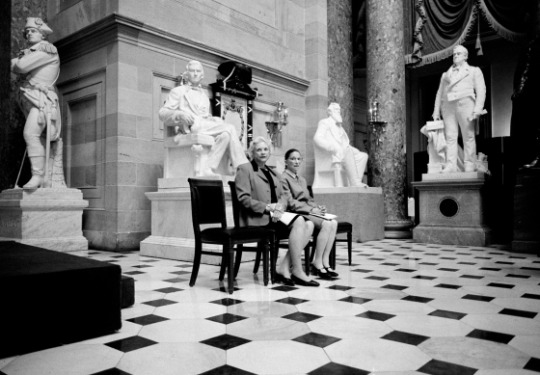
David Hume Kennerly—Getty Images March 2001 The only two female Justices of the U.S. Supreme Court, Sandra Day O’Connor and Ruth Bader Ginsburg, pose for a portrait in Statuary Hall, surrounded by statues of men at the U.S. Capitol Building in Washington, D.C. The two Justices were preparing to address a meeting of the Congressional Women’s Caucus.
The Great Dissenter
She didn’t disappoint. In one case after another, she asked the right questions (and usually the first one), cobbled together majorities and wrote elegantly reasoned opinions: striking down stricter requirements for abortion clinics designed to make the procedure extinct (Whole Woman’s Health v. Hellerstedt), and approving gay marriage (Obergefell v. Hodges), making the point during oral argument that if you can’t refuse a 70-year-old couple marriage because they can’t procreate, how could you use that excuse to deprive a gay one.
But it was her minority — not her majority — opinions that made her beloved to a new generation of women. As the court tilted right in 2006 after the retirement of Sandra Day O’Connor, Ginsburg started to read, not just file, her dissents to explain to the majority why they were wrong in hopes that “if the court has a blind spot today, its eyes will be open tomorrow.”
Here was a shy, understated incrementalist suddenly becoming the Great Dissenter. In Shelby County v. Holder, she said that relieving errant states of the close scrutiny of the Voting Rights Act was like “throwing away your umbrella in a rainstorm because you are not getting wet.” In Hobby Lobby, she was aghast that the court would deny costly contraception coverage to working women “because of someone else’s religious beliefs.” In the Ledbetter v. Goodyear Tire & Rubber equal pay case, she asked how her brethren could penalize the plaintiff, who only got evidence of the disparity from an anonymous note, for missing a 180-day filing deadline given that salaries are kept secret. One person whose eyes were opened was Barack Obama. His first piece of legislation in 2009 was the Lilly Ledbetter Fair Pay Act.

Karsten Moran—ReduxA woman attending the New York City Women’s March wears a t-shirt featuring Supreme Court Justice Ruth Bader Ginsburg on Jan. 20, 2018.
Becoming the Notorious RBG
Ginsburg’s womansplaining caught the attention of New York University law student Shana Knizhnik, who uploaded Ginsburg’s dissents to Tumblr. Overnight, a younger generation of women, and their mothers and grandmothers, were reminded of what Ginsburg had done for them. Knizhnik joined with reporter Irin Carmon to write Notorious RBG: The Life and Times of Ruth Bader Ginsburg. The justice was soon a recurring character on Saturday Night Live, with a hyperkinetic Kate McKinnon issuing blistering “Ginsburns.” The justice’s 2016 memoir, My Own Words, was a New York Times bestseller. There were more books — adult, children’s and coloring. In 2018, Hollywood released a major motion picture, On the Basis of Sex, and the documentary RBG, which won an Emmy. Store shelves groan with merch: mugs (you Bader believe it), onesies (The Ruth will set you free), tote bags, bobblehead dolls, and action figures, one of the latest from her cameo in Lego Movie 2, produced by none other than Trump Administration Treasury Secretary Steve Mnuchin.
All this late-arriving fame rested uneasily on the shoulders of Ginsburg, who accepted it with dignity and took some pleasure at grandchildren’s shock that “so many people want to take my picture.” She kept a large supply of Notorious RBG T-shirts as a party favor for visitors.
At the heart of Hollywood’s treatment of Ginsburg wasn’t only the case Marty and his wife worked on together—an appeal of an IRS ruling—but a marriage of extraordinary compatibility and mutual support. After he recovered from cancer and had become a sought-after lawyer, he eagerly took on his share of domestic duties, which included feeding the children since, according to former Solicitor General Ted Olson, “Ruth wanted nothing whatsoever to do with the kitchen.” Marty was the fun parent (Ginsburg joked at her confirmation hearing that the children kept a log called “Mommy Laughed”) and a big-hearted host who happily roasted “Bambi,” Ruth’s name for whatever Scalia, her opera buddy, bagged on his last hunting trip. The pair were the subject of an actual comic opera, Scalia/Ginsburg, in which one scene depicts the over-emoting Scalia, locked in a dark room for excessive dissenting, and Ginsburg descending through a glass ceiling to rescue him.
A fellow justice said that neither Ginsburg would be who they were without the other. Marty once joked about being second banana: “As a general rule, my wife does not give me any advice about cooking and I do not give her any advice about the law. This seems to work quite well on both sides.” De Hart reprints the letter Marty put in a drawer in the bedside table as he was dying from a recurrence of his cancer. He was the “most fortunate” part of her life.
Marty lived to see his wife recognized beyond what the two imagined when they agreed to marry and be lawyers together, but died just before a slight she suffered for following him to New York was righted. In 2011, she was awarded an honorary degree from Harvard Law that Dean Griswold had denied her for taking her last credits at Columbia.
The longer she lived, the wider her reach and the deeper the appreciation for her years on the bench. At the opening concert of the National Symphony Orchestra in Sept. 2019, Kennedy Center chair David Rubinstein introduced the dignitaries in the audience. When he got to the justice, women rose to applaud her. Then, the men quickly joined in until everyone in the hall was standing, looking up at the balcony, cheering and whistling, as if they’d come to tell her that they knew what she had done for them, not to hear Shostakovich’s Piano Concerto #2.
This wasn’t an audience of liberals, but a cross-section of the capital touched by a once-young lawyer who saw unfairness and quietly tried to end it during her 60 years of public service.
Throughout the decades, Ginsburg quietly persisted—through discrimination she would seek to end, through the death of Marty, through more illness and debilitating treatments than any one person should have to endure—without complaint, holding on and out, until sheer will was no longer enough.
from TIME https://ift.tt/2RHBzbQ
0 notes
Text
New top story from Time: Ruth Bader Ginsburg Has Died. She Leaves Behind a Vital Legacy for Women — and Men
On March 15, 2019, legions of Ruth Bader Ginsburg’s admirers celebrated her 86th birthday by dropping to the ground and grinding out the Super Diva’s signature push-ups on the steps of courthouses around the country.
This unusual tribute to a Supreme Court justice was one of the many ways a new generation has shown the love to the five-foot tall legal giant who made the lives they live possible. But by Sept. 18, her iron will and gritty determination was no longer enough to propel her to court. Ginsburg died on Friday at the age of 87 of complications from metastatic pancreatic cancer, according to a statement released by the Supreme Court, per the Associated Press.
In the early ’70s—when Gloria Steinem was working underground as a Playboy Bunny to expose sexism, and Betty Friedan was writing a feminist manifesto about “the problem with no name”—Ginsburg named the problem, briefed it, and argued it before the Supreme Court of the United States.
She was 37 then, on the receiving end of so much of the discrimination she would work to end, and she was just undertaking her first job as a litigator—as co-director of the Women’s Rights Project of the American Civil Liberties Union. In her “very precise” way, as Justice Harry Blackmun put it, she studied title, chapter, clause, and footnote of the legal canon that kept women down and overturned those that discriminated on the basis of sex in five landmark cases that extended the 14th Amendment’s equal rights clause to women. In that long, hard slog, she employed some novel devices, using “gender” (so as not to distract male jurists with the word “sex”) and representing harmed male plaintiffs when she could find one (to show that discrimination hurts everyone). And she never raised her voice.
When she was done, a widower could get the same Social Security benefits as a woman and a woman could claim the same military housing allowance as a man. A woman could cut a man’s hair, buy a drink at the same age, administer an estate, and serve on a jury.
By the time she left the ACLU, and before she donned her first black robe, Ginsburg had brought about a small revolution in how women were treated, wiping close to 200 laws that discriminated off the books. Over the next decades, first as a judge on the U.S. Court of Appeals for the District of Columbia, appointed by President Jimmy Carter in 1980, and then as the second woman on the Supreme Court, appointed by President Bill Clinton in 1993, she would become to women what Thurgood Marshall was to African Americans. She employed the same clause in the 14th Amendment he used to free former slaves to extend protection to the mentally ill who wanted to live outside institutions, gays who wanted to marry, immigrants who lived in fear, and, of course, females: those who wanted to be cadets at the Virginia Military Institute, have access to abortion, and, when pregnant, not be fired if they couldn’t perform duties their condition made, temporarily, impossible.
Her fans’ courthouse celebration was also a plea for the bionic Ginsburg to carry on, at least until the 2020 election. There was high anxiety when she fell asleep at the State of the Union in 2015 (a case of enjoying a fine California wine brought by Justice Anthony Kennedy to the justices pre-speech dinner) and even more when she missed the court’s 2019 opening session in January, her first such absence in 26 years. She hadn’t fully recovered from surgery to remove three cancerous nodules from her lungs. But she took her seat as the senior justice next to Chief Justice John Roberts in mid-February, picking up her full caseload. That following summer, she went through radiation to treat a cancerous tumor on her pancreas, her fourth brush with cancer. In July 2020, she announced that cancer had returned yet again. Despite receiving chemotherapy for lesions on her liver, the 87-year-old reasserted that she was still “fully able” to continue serving on the Supreme Court.
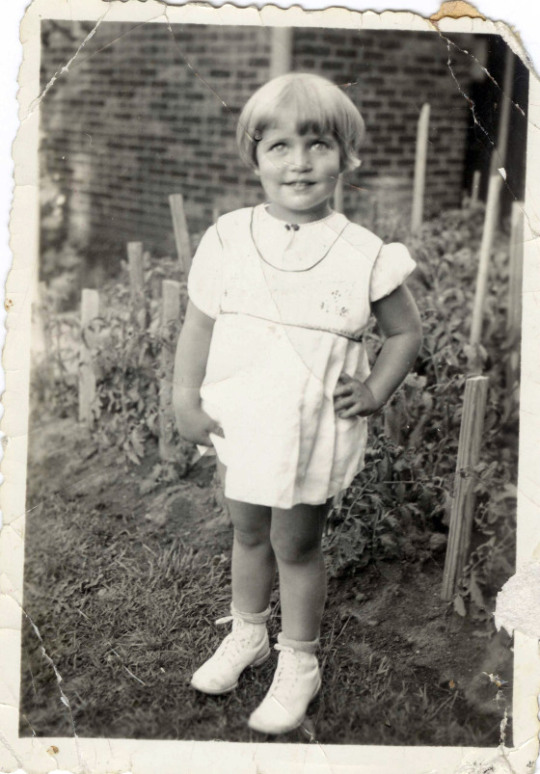
Collection of the Supreme Court of the United StatesAugust 2, 1935 Childhood photograph of Ruth Bader taken when she was two years old.
Baton-twirling bookworm
Joan Ruth Bader was born in 1933 in Brooklyn and came of age during the Holocaust, “a first-generation American on my father’s side, barely second-generation on my mother’s … What has become of me could happen only in America,” she said at her confirmation hearing.
True enough, but what would become of her was a long time coming. In an enthralling biography, Jane Sherron De Hart describes schoolgirl Ruth, who twirled a baton but was such a bookworm she tripped and broke her nose reading while walking. Her mother, who convinced her she could do anything, died just before Ruth, the class valedictorian, graduated and headed off to Cornell. There she met the tall, handsome Martin Ginsburg, and married him the minute she graduated Phi Beta Kappa—the first person, she said, who “loved me for my brain.” She’d been accepted to Harvard Law, where Marty was already enrolled. She calls “meeting Marty by far the most fortunate thing that ever happened to me.”
What happened next is proof of her maxim that “a woman can have it all, just not all at once.” Marty was called up to active duty, so instead of studying torts in Cambridge, Ginsburg found herself working as a claims examiner at the Social Security Administration in Fort Sill, Oklahoma—that is, until she was demoted with a pay cut for working while pregnant.
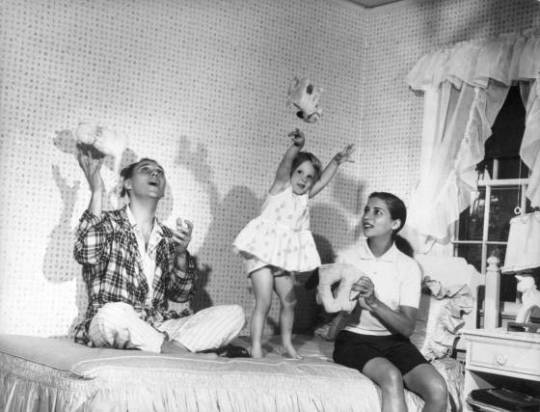
Collection of the Supreme Court of the United StatesSummer 1958 Ruth Bader Ginsburg and Martin Ginsburg play with their three-year old daughter, Jane, in her bedroom at Martin’s parents’ home in Rockville Centre, N.Y
Life threw another wrench into the works when both were back at Harvard with a baby girl, and Marty was stricken with a rare testicular cancer. Ruth went to class for both of them, typing up his notes and papers as well as her own, getting along on even less sleep than your usual new mother, all while being scolded for taking up a man’s seat by Dean Erwin Grisold. When her husband graduated and was offered a prestigious job at a white shoe law firm in New York, she gave up her last year at Harvard to finish at Columbia.
Once again, she felt the sting of the discrimination. Despite being the first student ever to serve on both the Harvard and Columbia Law Reviews and graduating at the top of her class, she couldn’t get a job at a premier law firm or one of the Supreme Court clerkships that went so easily to male classmates who ranked below her. According to DeHart, Judge Felix Frankfurter fretted a woman clerk might wear pants to chambers. Without bitterness, she calls anger a useless emotion; she noted that in the ’50s, “to be a woman, a Jew and a mother to boot—that combination was a bit too much.”

Librado Romero—The New York Times/Redux 1972 Ruth Bader Ginsburg in New York, when she was named a professor at Columbia Law School.
Battling discrimination
She didn’t get outwardly angry and only, after many years, got even. She took a lower court clerkship, researched civil procedure (and equality of the sexes in practice) in Sweden and wrote a book on the subject—in Swedish! She returned home to teach at the Newark campus of Rutgers Law, where she co-founded the Women’s Rights Law Reporter. Despite being a progressive school, discrimination struck again. She learned she didn’t earn the same as a male colleague because, the dean explained, “he has a wife and two children to support. You have a husband with a good paying job in New York.” No wonder then, when she found herself surprisingly (given her husband’s medical history) but happily pregnant again, she took no chances and hid it.
After the birth of her son, James, she became a tenured professor at Columbia, co-authored the first case book on discrimination law, a work in progress as she changed much of it while litigating for the ACLU, until in 1980 she joined the Court of Appeals.
Then, in 1993, President Bill Clinton was elected and he wanted a Cabinet, and by extension a Supreme Court, that looked like America. Ginsburg was on the list, but so were a dozen others and she wasn’t at the top.
Even Clinton’s deliberations weren’t without a peculiar form of discrimination as he worried, “the women are against her.” He was right. To the feminists of the ’90s—who might be ignored by the White House if it weren’t for Ginsburg’s decades of opening doors—she was yesterday. The judge methodically chipping away at bias, without burning a bra or tossing a high heel, looked plodding and uninspiring; her friendship with her colleague on the district court, Scalia, looked suspect.
Enter Marty. “I wasn’t very good at promotion, but Marty was,” she told the late Gwen Ifill, a PBS anchor. “He was tireless”—and beloved among lawyers, professors, and politicians. Women came around, reminded that she was a pioneer in their fight to overcome the patriarchy and a steadfast supporter of abortion rights, despite acknowledging in an interview that the country might be politically better off if the states had continued to legalize abortion rather than have Roe v. Wade as a singular target of its foes. Ginsburg was confirmed 96 to 3.
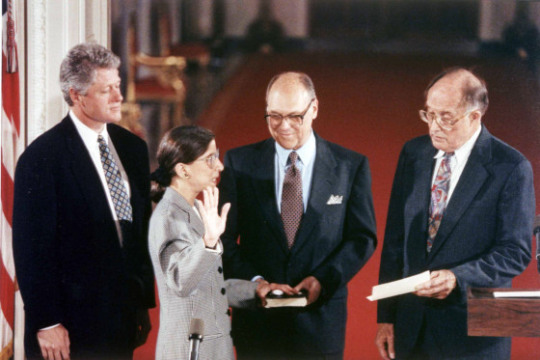
Collection of the Supreme Court of the United States August 10, 1993 Justice Ruth Bader Ginsburg is sworn in as an Associate Justice of the Supreme Court. From left to right stand President Bill Clinton, Justice Ruth Bader Ginsburg, Martin Ginsburg, and Chief Justice William Rehnquist.
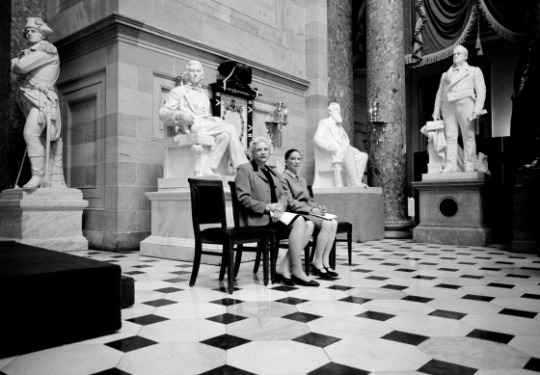
David Hume Kennerly—Getty Images March 2001 The only two female Justices of the U.S. Supreme Court, Sandra Day O’Connor and Ruth Bader Ginsburg, pose for a portrait in Statuary Hall, surrounded by statues of men at the U.S. Capitol Building in Washington, D.C. The two Justices were preparing to address a meeting of the Congressional Women’s Caucus.
The Great Dissenter
She didn’t disappoint. In one case after another, she asked the right questions (and usually the first one), cobbled together majorities and wrote elegantly reasoned opinions: striking down stricter requirements for abortion clinics designed to make the procedure extinct (Whole Woman’s Health v. Hellerstedt), and approving gay marriage (Obergefell v. Hodges), making the point during oral argument that if you can’t refuse a 70-year-old couple marriage because they can’t procreate, how could you use that excuse to deprive a gay one.
But it was her minority — not her majority — opinions that made her beloved to a new generation of women. As the court tilted right in 2006 after the retirement of Sandra Day O’Connor, Ginsburg started to read, not just file, her dissents to explain to the majority why they were wrong in hopes that “if the court has a blind spot today, its eyes will be open tomorrow.”
Here was a shy, understated incrementalist suddenly becoming the Great Dissenter. In Shelby County v. Holder, she said that relieving errant states of the close scrutiny of the Voting Rights Act was like “throwing away your umbrella in a rainstorm because you are not getting wet.” In Hobby Lobby, she was aghast that the court would deny costly contraception coverage to working women “because of someone else’s religious beliefs.” In the Ledbetter v. Goodyear Tire & Rubber equal pay case, she asked how her brethren could penalize the plaintiff, who only got evidence of the disparity from an anonymous note, for missing a 180-day filing deadline given that salaries are kept secret. One person whose eyes were opened was Barack Obama. His first piece of legislation in 2009 was the Lilly Ledbetter Fair Pay Act.

Karsten Moran—ReduxA woman attending the New York City Women’s March wears a t-shirt featuring Supreme Court Justice Ruth Bader Ginsburg on Jan. 20, 2018.
Becoming the Notorious RBG
Ginsburg’s womansplaining caught the attention of New York University law student Shana Knizhnik, who uploaded Ginsburg’s dissents to Tumblr. Overnight, a younger generation of women, and their mothers and grandmothers, were reminded of what Ginsburg had done for them. Knizhnik joined with reporter Irin Carmon to write Notorious RBG: The Life and Times of Ruth Bader Ginsburg. The justice was soon a recurring character on Saturday Night Live, with a hyperkinetic Kate McKinnon issuing blistering “Ginsburns.” The justice’s 2016 memoir, My Own Words, was a New York Times bestseller. There were more books — adult, children’s and coloring. In 2018, Hollywood released a major motion picture, On the Basis of Sex, and the documentary RBG, which won an Emmy. Store shelves groan with merch: mugs (you Bader believe it), onesies (The Ruth will set you free), tote bags, bobblehead dolls, and action figures, one of the latest from her cameo in Lego Movie 2, produced by none other than Trump Administration Treasury Secretary Steve Mnuchin.
All this late-arriving fame rested uneasily on the shoulders of Ginsburg, who accepted it with dignity and took some pleasure at grandchildren’s shock that “so many people want to take my picture.” She kept a large supply of Notorious RBG T-shirts as a party favor for visitors.
At the heart of Hollywood’s treatment of Ginsburg wasn’t only the case Marty and his wife worked on together—an appeal of an IRS ruling—but a marriage of extraordinary compatibility and mutual support. After he recovered from cancer and had become a sought-after lawyer, he eagerly took on his share of domestic duties, which included feeding the children since, according to former Solicitor General Ted Olson, “Ruth wanted nothing whatsoever to do with the kitchen.” Marty was the fun parent (Ginsburg joked at her confirmation hearing that the children kept a log called “Mommy Laughed”) and a big-hearted host who happily roasted “Bambi,” Ruth’s name for whatever Scalia, her opera buddy, bagged on his last hunting trip. The pair were the subject of an actual comic opera, Scalia/Ginsburg, in which one scene depicts the over-emoting Scalia, locked in a dark room for excessive dissenting, and Ginsburg descending through a glass ceiling to rescue him.
A fellow justice said that neither Ginsburg would be who they were without the other. Marty once joked about being second banana: “As a general rule, my wife does not give me any advice about cooking and I do not give her any advice about the law. This seems to work quite well on both sides.” De Hart reprints the letter Marty put in a drawer in the bedside table as he was dying from a recurrence of his cancer. He was the “most fortunate” part of her life.
Marty lived to see his wife recognized beyond what the two imagined when they agreed to marry and be lawyers together, but died just before a slight she suffered for following him to New York was righted. In 2011, she was awarded an honorary degree from Harvard Law that Dean Griswold had denied her for taking her last credits at Columbia.
The longer she lived, the wider her reach and the deeper the appreciation for her years on the bench. At the opening concert of the National Symphony Orchestra in Sept. 2019, Kennedy Center chair David Rubinstein introduced the dignitaries in the audience. When he got to the justice, women rose to applaud her. Then, the men quickly joined in until everyone in the hall was standing, looking up at the balcony, cheering and whistling, as if they’d come to tell her that they knew what she had done for them, not to hear Shostakovich’s Piano Concerto #2.
This wasn’t an audience of liberals, but a cross-section of the capital touched by a once-young lawyer who saw unfairness and quietly tried to end it during her 60 years of public service.
Throughout the decades, Ginsburg quietly persisted—through discrimination she would seek to end, through the death of Marty, through more illness and debilitating treatments than any one person should have to endure—without complaint, holding on and out, until sheer will was no longer enough.
via https://cutslicedanddiced.wordpress.com/2018/01/24/how-to-prevent-food-from-going-to-waste
0 notes
Text
It’s May!
And I’ve been so sick.
So basically it started on the 16th of April when I went in to get a mole on my back looked at. I thought they were going to just examine it and we’d book a different time for the actual operation if it needed to be removed. Well, they said they’d remove it immediately and it wasn’t until the knife was on my back that the doctor cared to mention that I couldn’t move my back for 2 weeks until the stitches get removed. Well, I had a bunch of ballet rehearsals and a recital and my own students had their recitals so yay? Obviously I had also gone to the doctor’s office by bike and with a backpack so coming back was quite difficult. I managed to make my way to work for a few hours until the local anesthesia wore off and it started to hurt a lot. I cannot believe how people go through liposuctions or breast lifts and live to tell the tale.. I only had a tiny 5cm scar with a few stitches and it hurt so bad. I also didn’t want to take painkillers because I was afraid I would tear my scar open if I forgot about the pain. Anyway for the next four or so nights I had to sleep on my stomach and that wasn’t great.
I guess the stress from the mole removal combined with the lack of sleep made a flu flare up. I had a practical training for understanding and supporting motor development difficulties the next day and that was also interesting with an aching scar on my back. On Wednesday I started getting fever aches but had meetings and work to do so I relied on flu medication and kept going despite feeling miserable. Naturally that was a horrible idea since my flu kept getting worse and it dragged on for almost 2 weeks. On Sunday the 22nd I lost my voice completely after teaching my dance classes. I know I’ve “lost my voice” in the past but that just means you sound croggy and your throat hurts. This time literally nothing came out of my mouth even if I tried to scream. Naturally I had a job interview the next day and with gargling salt water, steam breathing with herbs and eating honey with a spoon I managed to cough out a few words for the interview. Probably won’t get the job though but at least I got interviewed out of a total of 80 applicants - which is amazing considering my age and experience. Regardless after that interview I had to go bring some printouts to a course that was starting and make sure everything was okay with them, and after that I cancelled everything for the rest of the week. I didn’t go to ballet on Monday but had to go on Tuesday because I’ve already missed 3 weeks of spring recital rehearsals. I had to cancel a meeting and office work from tuesday, another meeting from thursday and a substitute gig from thursday evening. I stayed in, drank insane amounts of ginger tea and laid on the sofa feeling miserable. On Wednesday me and mum went to visit grandmum in the hospital because she fell and fractured her spine.. Luckily she can walk and everything so no mobility was lost but she’s in a lot of pain and obviously the quality of physiotherapy isn’t great over there and she’s already old and has a hard time moving around so it isn’t looking too great.. If only she managed to keep moving despite the pain and didn’t get completely stuck in bed. I brought her some of my favourite books to keep her company while she recovers.. Poor grandmum ♥
I spent my birthday on Thursday the 26th silent and miserable but at least I had a friend come over to play ACNL with me for a bit. Needless to say other than that it was a pretty sad birthday..
On Friday I had my voice somewhat return but that only gave way for an insane cough and a near continuous nosebleed. My friend came over again to play ACNL and I had ballet in the evening. The entirety of Saturday was spent at our dance recital for the international day of dance. I went to buy groceries in the morning and then we rehearsed our staging and lights at 14:10, had a dress rehearsal at 15:00 and a show at 17:00. We had to stay until the end because we all got a rose and had to wait for that. We also satyed behind to take lots of pictures so it wasn’t until 8-ish at night that I was back home. And yup, the recital was bad because of my cough but I managed and had fun with my friends.
On Sunday my 7-9 year olds performed their Waltz of the Hours from Coppelia. I tried to save my voice in the mommy and me class before that and somehow managed to address the parents of my little ballerinas and wish everyone a happy summer. It all went surprisingly well though and one of my two groups is now on summer vacation. My other class performs next Sunday.
As my cough started getting better and there was less snot coming out of every orifice of my body the gums on top of my bottom right wisdom tooth got insanely inflamed and sore. It hurt all the way to my jaw bone and I couldn’t swallow or make any facial expressions. Even coughing hurt a lot and I had to constantly be on painkillers. Sunday through Tuesday was very painful but now it’s subsided into a dull ache that flares up when I eat or open my mouth. I just want to be healthy again and this experience has been really eye opening in regard to those with chronic pain or illnesses. I’m this miserable and weak from 3 weeks of stitches, a damn common cold and a tooth ache so my heart really goes out to those people who have to suffer day in and day out...
I woke up early on Monday to wash my toilet and vacuum the house because I’ve had to neglect everything during my sickness. then I went to get my stitches removed and I thought that would mean that I’m in the clear with my back but nope. Obviously now that the stitches are gone it’s at a high risk of ripping open and I still have to spend a couple of weeks not bending my back or lifting heavy stuff. I also need to apply a silicone cream on it for 90 days to help the scar so that it forms normally and doesn’t become a keloid scar since my body tends to do that. Anyway I spent the rest of Monday with my (pretty much only) university classmate and my friend who came to play ACNL with me and go shopping for May Day (Labor day) in the evening.
May 1st was spent celebrating. My tooth hurt real bad and the weather was cold and rainy so that we couldn’t go out for a picnic this year. I didn’t even wear my graduation cap or student overalls, which is kind of sad since it was my last labor day as a university student (unless I go back in for a PhD).. Anyway my ACNL friend and two other friends from high school came over, we made pizza and played Amiibo Festival. We also played some card games and finished off the evening with some awesome cards against humanity shenanigans. I had a lot of fun even though it didn’t really feel like May 1st because of the weather. Spring is super late this year.
Today I’ve written a job application (like I tend to do at least once a week..) and paid my rent. I’m trying to get back into playing the piano and I’m enjoying it a lot. I just feel like I need to revise a lot of my scales and chords because all my favourite songs tend to be in C major and I’ve pretty much forgotten everything else. I also have very little patience for learning new songs which sucks. I keep learning the start of a new song and then getting bored. I want a job so that I can afford a piano tutor or classes again... I want to get better. My guy’s little sister is an insanely talented singer and she plays the guitar really well and so I wish music could be an even bigger part in my life as well. I admire her a lot but at the same time it makes me sad knowing that I have no talent for such (or for anything else for that matter) and even if I did learn something cool I’d never want anyone to hear. It’s like I want recognition but I’m terrified of people knowing about me and this is a bad combination. Anyway for now I just want to play because it’s fun and it makes me feel accomplished.
I’m attending a website training for work tomorrow morning and going to the office after that. I’m a bit scared since it’s been a couple of weeks and I bet there’s a ton of stuff that’s been piling up. I just have to think about the money, especially now that I won’t get paid from my summer job until the end of June, and I need something to pay June’s rent with... Overall this is a pretty chill week and I’m happy about that. I need to make this a chill month since it’s practically my summer vacation.
0 notes